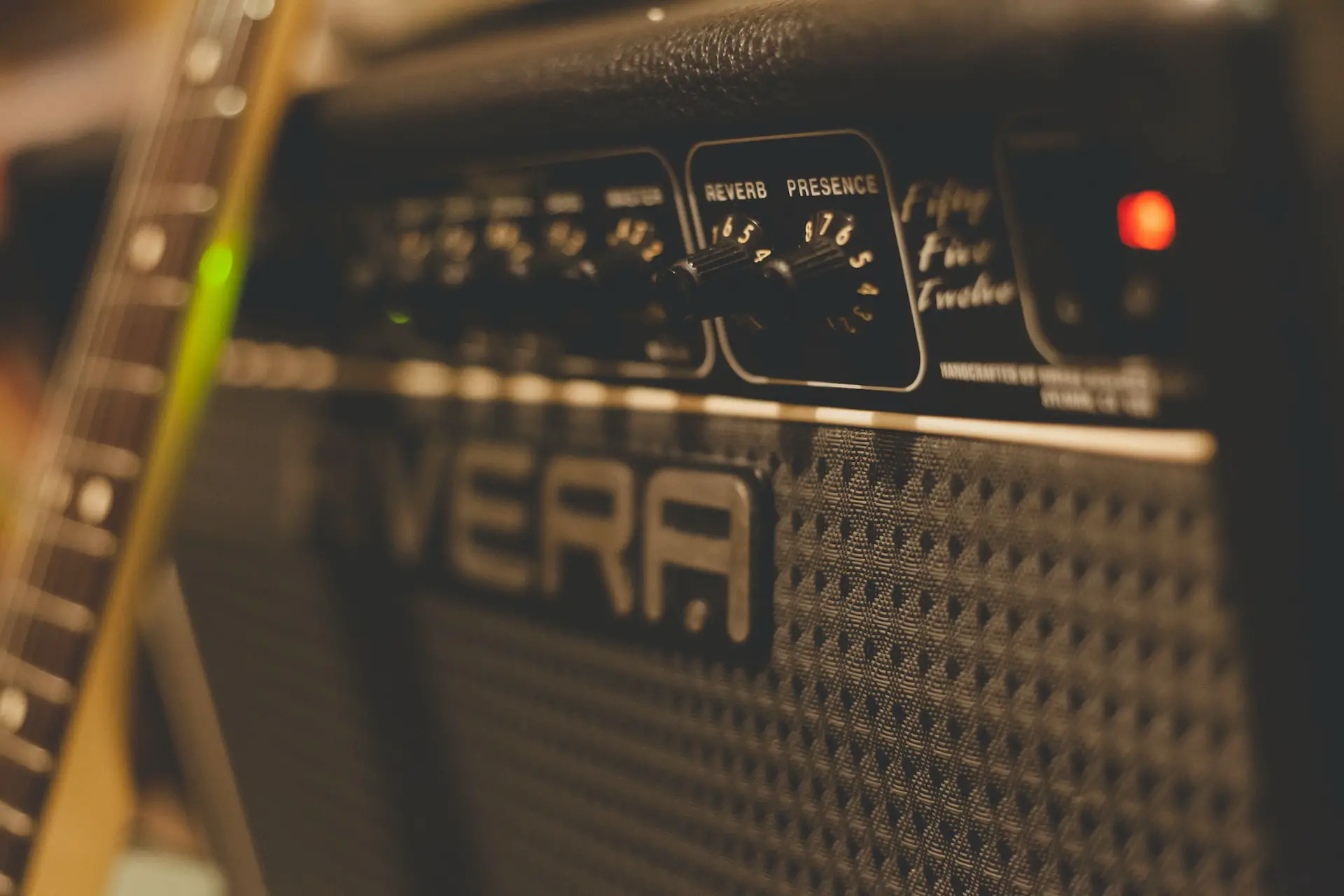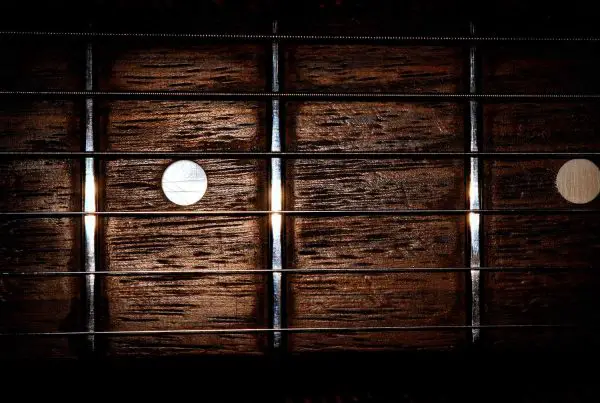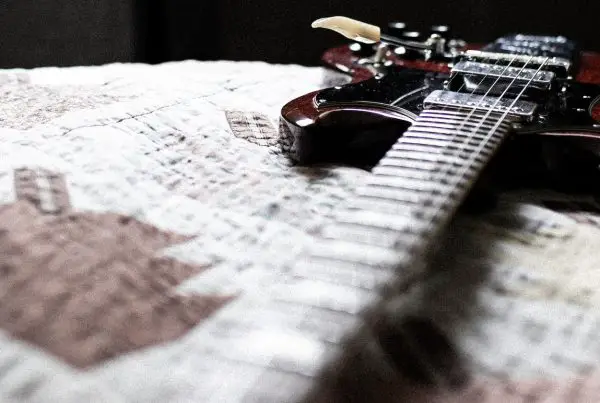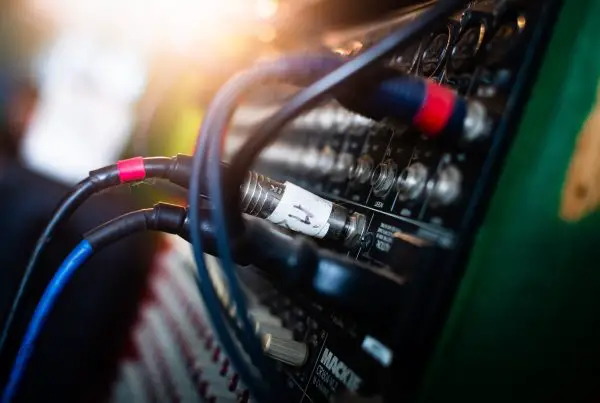Getting ready to jam and then dealing with a lot of buzzing from your amplifier can be incredibly annoying. However, the good news is that this is a complete guide to help troubleshoot should it happen.
Below are the most common types of amp buzzing (and if you experience any of them, you are in luck because we will discuss how to fix them!)
- Amplifier buzzing right when you turn it on
- Amplifier buzzing when the guitar is plugged in
- Buzzing when the strings are not touched
- Buzzing only when playing specific notes
- Buzzing due to bad cables
- Buzzing due to the thickness of your strings
- Buzzing due to new strings,
- Buzzing when plugged into pedals
- Buzzing when playing your guitar with a capo
As someone who has played the guitar for over seven years, I can confirm that plenty of factors will influence the amplifier and cause buzzing sounds. I can also ensure that several options are available to reduce the buzzing sounds you will hear.
In this article, we will go over the different causes of amplifier buzzing and tips to stop it from occurring. We will also go over some frequently asked questions, such as if it is normal for a guitar amplifier to buzz and if a small amount of buzzing is acceptable.
The Causes of Different Types of Amp Buzz & How to Stop Them
There are several different reasons why your amplifier may be buzzing. The tips listed below are some reasons an amplifier may be buzzing but are by no means a completely inclusive list.
Please visit the links under these headings for more detailed information on any specific buzzing problem you are facing with your amplifier.
Please also remember that as you review this material, it is best to treat identifying and eliminating any unwanted buzzing sounds as an investigative process.
If, after reviewing all of this information, you are still unable to locate and eliminate the unwanted buzzing sound, then it may be best to take your amplifier and guitar to a technician to locate and identify the cause of the unwanted buzzing.
However, by following these tips, you should be able to find and eliminate most unwanted buzzing from your amplifier. The more you go through this process, the easier it will become.
1. Amp Buzz Right After It’s Turned On (Not Plugged to Guitar Yet)
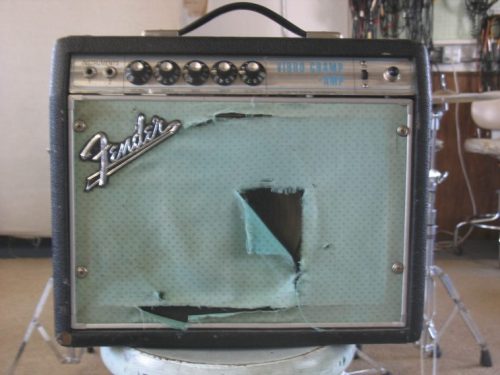
An amplifier can start to buzz right after it has been turned on due to a bad power cable that can not carry the electrical current from the power outlet to the amplifier.
Note: Power cable is the cable that’s used to power up your amp.
You can confirm this issue by either replacing the power cord or simply plugging it into another electrical outlet. It is a good idea to have a spare power cable lying around just in case the current one goes bad on you suddenly.
Fluorescent lights can also cause unwanted buzzing sounds from an amp. This is because the fluorescent lights’ electromagnetic signal can cause the amplifier to buzz.
After all, the electromagnetic signal from the fluorescent lights has this reaction when interacting with the electromagnetic signal from the amplifier.
If you play in a room with fluorescent lighting, shut the lights off or bring another light source into the room you are playing in. This should eliminate any buzzing noises you will hear.
Full details here: Why Amp Starts Buzzing When Its Turned On: 5 Reasons & Fixes
2. Amp Buzz When Cable Is Plugged Into Guitar
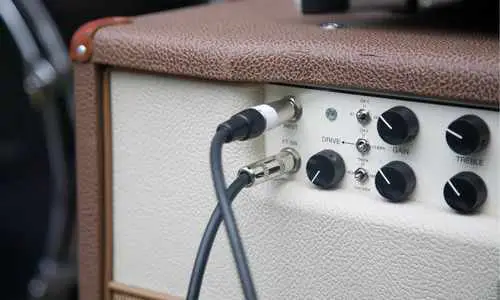
If your amplifier is buzzing when your guitar is plugged in, then it could be due to any of the reasons below:
- Single coil pickups
- Loose jack
- Dusty jack
Single coil pickup
Playing with single-wound pickups can create a feedback type of buzzing sound if you stand too close to the amplifier. Simply backing away from the amplifier when playing will eliminate this sound.
You may also want to experiment with humbucker pickups. The dual winding of the coils in humbucker pickups helps to eliminate any unwanted buzzing sounds.
Loose jack
If any jacks where you plug in the guitar cable are loose (either in the amplifier or the guitar), this can also create a large amount of amp buzzing sounds. The buzzing sounds you will often hear can be resolved by tightening the loose jack.
Dusty jack
Dust can also create a problem of buzzing sounds when you have plugged your cable into the guitar.
You can resolve this by simply taking a Q-Tip and applying rubbing alcohol to the end to clean all the dust out of your jacks. Please wait at least an hour after cleaning the jacks before plugging your guitar back in to play it again.
Full details here: Amp Buzzing When Plugged Into Guitar: 7 Reasons & Fixes
3. Amp Buzz When String Isn’t Touched
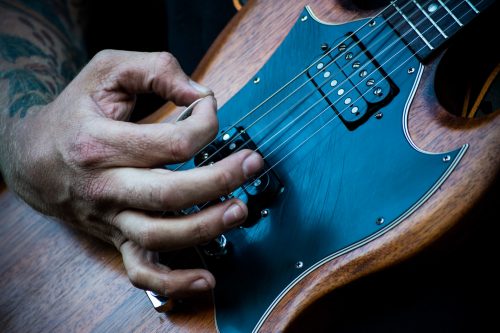
If an amp buzzes only when the strings are not touched, then It may be an electrical grounding issue with the amp. If this is the case, simply touching the strings will help eliminate the buzzing sounds you will hear.
To really fix this issue, you have to open the guitar up and examine it to see if there are any loose wires causing the guitar to have these grounding issues.
Identifying loose wires or wires that may cause a grounding issue can be time-consuming. Many guitar technicians will even take the time to go through all of the connections inside the guitar with a magnifying glass to identify and eliminate the problem.
If this is something you have yet to experience or feel comfortable doing, consider taking the guitar to your local music store to have it checked out by a guitar technician.
Full details here: Why Does Amp Buzz When The String Isn’t Touched: Is It Normal?
4. Amp Buzz When Playing Certain Notes

If there is something loose inside the amplifier or your cabinet, then playing specific notes may cause a buzzing sound from your amplifier.
All notes will ring at a specific frequency. Some frequencies will have a higher, more intense vibration than others.
If you notice this happening, you will need to open your amplifier or cabinet by removing the screws and checking to ensure that none of the screws have come loose inside the amplifier.
If you notice any of the screws are loose, screwing them back securely should help rectify this matter.
If this does not fix the matter, consider looking at any objects around the amplifier. You hear the buzzing from a lantern next to the amplifier or a loose heating or air conditioning vent.
Taking a few minutes to look around the amplifier for any objects vibrating from the playing can solve this problem.
Full details here:
- Why Amp Buzzes & Rattles Only On Certain Notes: Causes & Fix
- How To Fix Buzzing on High E String? (Low Frets & High Frets)
5. Amp Buzz Due to Bad Cables
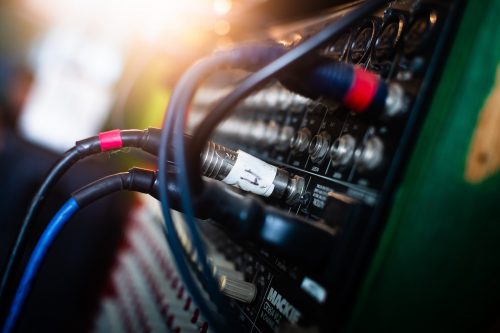
Over time, the internal wires inside a guitar cable can go bad – which causes a buzzing sound when you are playing.
Guitar cables have a lot of internal wiring that runs through them, carrying the electrical signal from your vibrating strings through the pickups to the amplifier itself.
Although the wiring is wrapped inside the cable, there are some signs you could identify to indicate that a guitar cable has gone bad:
- Cracking on the cable plastic covering
- Rust or discoloration on the end of the cable that is plugged into the jack, this can sometimes be removed with sandpaper. However, just doing this alone will fix the problem.
I suggest upgrading to the highest quality cable you can to ensure it will last as long as possible. If your guitar cable has gone bad, it is usually easier to replace it. All guitar cables will eventually go bad anyway. Therefore, it is a good idea to have a spare one.
Full details: Can Bad Guitar Cable Cause Amp Buzz? Reason & Recommendation
6. Amp Buzz Due to String Thickness & Action
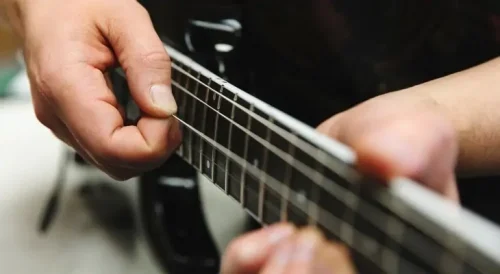
Lighter strings are more likely to cause buzzing because they vibrate with more frequency and intensity than thicker strings.
Consider checking the website for the guitar manufacturer you are playing to find the recommended gauge of strings you should be playing with.
If you want to experiment with different gauges of strings, you may consider adjusting the height of your guitar’s pickups (string action).
Your guitar action also plays a large role in buzzing. If your action is too low, the pickups will be too close to the strings and cause a buzzing or distorted sound
It’s the same logic as if you were singing into a microphone. If you placed your mouth too close to it, your voice would sound muffled and distorted.
If the microphone were too far from your mouth, your voice would sound tinny and far away. This works the same way with your guitar pickups (you will want to ensure that the pickups are just the right height to get the best sound possible).
Feel free to experiment until you find the gauge of strings and experiment with the height of your pickups until you have them exactly where you want them. Please check out this link for additional information:
Full details here:
- Low Action String: Is Fret Buzz Ok? (Guide To Stop & Fix It)
- How To Adjust Truss Rod To Fix Fret Buzz: Which Way To Turn?
7. Amp Buzz After Installing New Strings
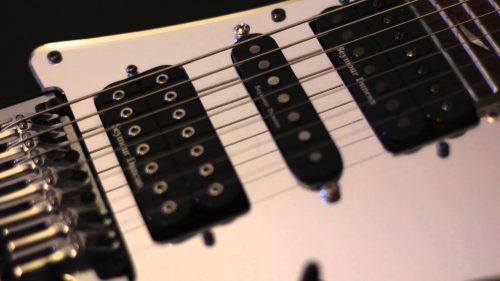
If new strings are causing buzz, then it’s most likely because the strings are a different gauge than what you typically play with. This may require adjusting your guitar to eliminate the buzzing noise you are hearing.
Changing the size and gauge of the strings you are playing may change the tension and shape of the neck on your guitar. You may need to adjust the neck and the action on your guitar accordingly to eliminate the buzzing sound you are hearing.
When purchasing new strings, I recommend going with the suggested gauge range of strings that the manufacturer of your guitar indicates.
The closer you are to the recommended gauge range of strings for your particular guitar, the more likely there will not be a buzzing sound caused by the new strings you just put on your instrument.
Full details here: Is It Normal For New String To Buzz? (How Long Does It Last)
8. Amp Buzz When Plugged into Pedal
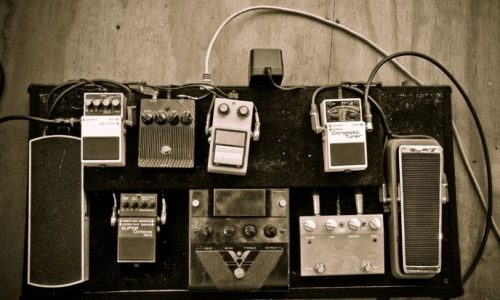
If you notice a buzzing sound when you are plugged into a pedal, then there may be an issue with the pedal or the chord you are using to connect the pedal. There may also be an issue with a loose connection in the pedal.
Consider changing the cables that you are using for each of the pedals. If this does not eliminate the buzzing sound, then the best bet is to remove each pedal and play your guitar until you find which pedal is causing the buzzing sound (if you are playing through more than one pedal, of course).
Once you have found the pedal causing the buzzing sound, check the jack in the pedal for dust or to see if it is loose. If there is a loose jack in the pedal or a large amount of dust in the jack, this can also cause a buzzing sound.
As with the amplifier jacks, try cleaning out any jacks in the pedal or pedals with rubbing alcohol and a Q-tip. Once you have done so, wait an hour before playing through the pedal again.
If you are still hearing buzzing sounds, there may be a loose connection inside the pedal that needs to be soldered back in place. Please check with the pedal manufacturer for additional information to troubleshoot it further.
Full details here: 3 Reasons & Fixes To Pedal Crackling, Popping & Buzzing
9. Guitar Buzz When Using Capo
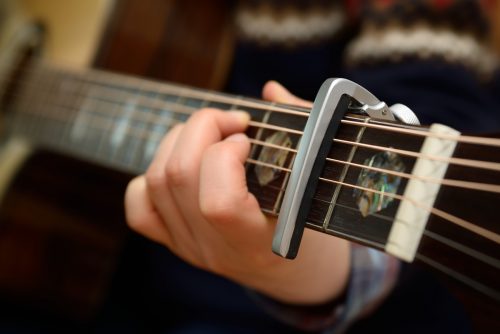
If you are experiencing a buzzing sound when playing with a capo, then it is likely that the buzz has nothing to do with the amplifier but other factors with the guitar itself. These include the action, uneven frets, and tension on the neck.
Moving the capo up and down the neck of your guitar will change the tension level in your strings. If the action (the distance the strings are raised from the neck of the guitar) is too low or high, this can cause a buzzing sound as it pushes against the neck. Adjusting your action to the correct height will often solve this problem.
If the frets on the neck of your guitar are different from the same height up and down the neck of the guitar, then this can cause your strings to vibrate unevenly as you strum them since they will create a buzzing sound as they vibrate against your frets. Adjusting your frets to the same level will help correct this problem.
The neck relief may also be the issue if playing with a capo is causing a buzzing sound. The neck relief refers to the concave bow of the neck on your guitar, which is adjusted by the truss rod. The truss rod runs from the bottom of the neck, attaches to the guitar itself, and runs through the neck.
Once you get the correct neck relief by adjusting the truss rod, you should no longer have an issue with a buzzing sound when playing with a capo.
Related article: Tips To Stop Using Capos: Do You Really Need A Capo?
Is It Normal for Amp to Buzz?
It is normal to have a small amount of buzzing when turning on your amplifier. This is because your amplifier runs a large amount of electricity through it, creating a slight humming sound, often referred to as a 60-cycle hum. This is similar to the noise you may hear when standing under power lines.
However, it is not normal for an amplifier to buzz so much that the sound of it is just as loud or even louder than your playing is. Additional troubleshooting is needed to identify the problem if this is the case.
I suggest doing so as soon as possible, as any loud, excessive buzzing sounds from the amplifier could cause long-term damage to your amplifier.
Is Small Amp Buzz Acceptable?
A small amount of buzzing sounds is acceptable from your amplifier. It is usual for your amplifier to have a slight amount of buzzing due to the large electromagnetic field that it will create when you power it on.
However, if the buzz sound is so loud that it overpowers the volume of your guitar playing, then an issue with either the amplifier or the guitar needs to be addressed.
Suppose you follow all of the information in this article and the corresponding links and are still unable to remove the excessive buzzing sound. In that case, you should consider taking the amplifier and/or the guitar to your local guitar technician.
For additional information regarding a small amount of amplifier buzz and how to address it if it is excessive, please review all the information and the corresponding links in this article on how best to handle it.
Will Amp Buzz Go Away by Itself?
Sometimes. Suppose the amplifier buzz does go away on its own. In that case, it is usually because someone moved the amplifier away from fluorescent lighting, plugged it into another electrical outlet, or rearranged their cables differently.
If you are plugged into a bad electrical outlet that is receiving a power surge, this can cause a buzzing by the surge electrical current, also known as dirty power.
This will sometimes resolve itself if you are plugged into one outlet and then plug into another outlet that does not have a power surge going through it (or if you are using a surge protector, which is recommended).
Shielding protects the electrical components around you against the electromagnetic field naturally created by electric equipment.
Smaller wires and cables coiled up next to large equipment, such as amplifiers, can be affected by many electromagnetic fields, which can cause the amplifiers to buzz. Simply removing cables from their locations next to large electromagnetic fields can often remove buzzing sounds from the amplifier.
There are also times when something as simple as playing in a room with no fluorescent lighting takes care of any buzzing sounds that are going on. Other times, standing farther away from the amplifier with single coil buzzing sounds will eliminate the buzzing sounds.
If the amp buzz you are hearing is an excessive abnormal amount of buzzing that is more than the normal amount, then it will not go away on its own. Following this article’s links and advice will help you find and eliminate any unwanted buzzing.
All of these are examples of amplifier buzzing disappearing on its own. However, when things like this usually happen, many guitar players will assume that the buzzing sounds went away on their own when they made a small change to stop the buzzing sounds without even realizing they had done so.
Conclusion
In conclusion, we went over the different causes of amplifier buzzing and tips to stop it from occurring. We also discussed if it is normal for a guitar amplifier to buzz, if a small amount of amplifier buzzing is acceptable, and if it will go away by itself.
When reviewing this information, please keep in mind that several factors can contribute to an unwanted buzzing of your amplifier. Although this can be a time-consuming process, with patience and due diligence, you should be able to identify and eliminate most unwanted buzzing sounds from your amplifier.
The more buzzing and other unwanted sounds you can eliminate, the more time you can focus on your guitar playing. Feel free to use any and all of this information to protect your amplifier and get the most playing time possible.


